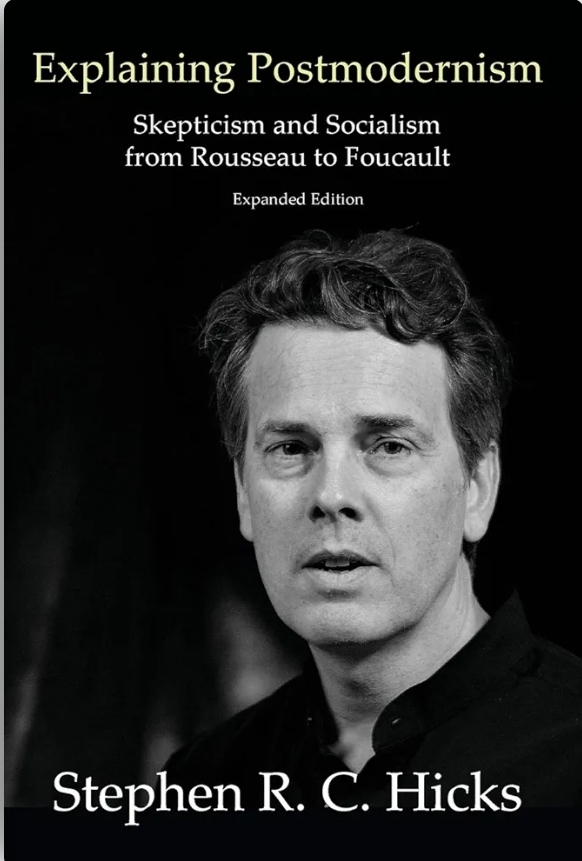Explaining Postmodernism: Skepticism and Socialism from Rousseau to Foucault by Stephen Hicks is a critical analysis of the intellectual origins and development of postmodernism. Hicks traces postmodern thought from its roots in the Enlightenment and Romanticism through key figures like Rousseau, Kant, Hegel, Nietzsche, and Marx, to modern thinkers like Michel Foucault, Jacques Derrida, and Jean-François Lyotard. He argues that postmodernism, with its characteristic skepticism of reason, objectivity, and truth, represents a reaction against Enlightenment values and serves as an ideological tool for promoting socialism and leftist politics.
Key Themes and Arguments
The Enlightenment and Modernity:
- Hicks begins by examining the Enlightenment, which championed reason, individualism, scientific progress, and liberal democracy. Philosophers like John Locke, Isaac Newton, and Voltaire believed that human reason could understand the world and improve society. They promoted political and economic freedom, grounded in the belief that human beings, through rational thought and action, could shape their own destinies.
- The Enlightenment project sought to build societies based on universal truths, objective knowledge, and individual rights. It also laid the intellectual foundation for liberal democracy and capitalism, which Hicks views as positive forces for human flourishing and freedom.
The Counter-Enlightenment:
- Hicks argues that postmodernism is a reactionary movement, emerging out of what he calls the Counter-Enlightenment. He identifies Jean-Jacques Rousseau as one of the earliest critics of Enlightenment values. Rousseau rejected the Enlightenment emphasis on reason and individualism, instead arguing that humans are naturally good but corrupted by society and modern institutions, such as private property and capitalism.
- Rousseau’s emphasis on emotion, community, and collective will became influential in Romanticism and later socialist and collectivist movements. Hicks argues that Rousseau’s thought laid the groundwork for the later rejection of Enlightenment ideals by postmodernists.
German Idealism and Skepticism:
- The next major stage in the development of postmodernism, according to Hicks, is the rise of German Idealism, especially the work of Immanuel Kant. Kant, while a product of the Enlightenment, argued that human reason is limited by the structures of our own minds and that we cannot know the world as it is in itself (noumena), but only as it appears to us (phenomena). This skepticism about human reason and objective reality, Hicks argues, planted the seeds for postmodernism’s radical epistemological skepticism.
- G.W.F. Hegel, Arthur Schopenhauer, and Friedrich Nietzsche further challenged Enlightenment ideas. Hegel introduced the notion of historicism, arguing that truth and reality are contingent on historical processes, while Nietzsche’s critique of Enlightenment rationality culminated in the rejection of absolute truth, replacing it with perspectivism and the will to power. Hicks suggests that Nietzsche’s nihilism and rejection of objective morality paved the way for the radical subjectivism of postmodernism.
Marxism and the Failure of Socialism:
- Hicks argues that the failure of socialism in the 20th century, particularly the collapse of the Soviet Union and the general failure of Marxist economics to deliver prosperity, played a significant role in the rise of postmodernism. He suggests that many intellectuals who were sympathetic to socialism found it difficult to defend Marxism on rational or empirical grounds, given the economic success of capitalist societies and the atrocities committed by communist regimes.
- As a result, many former Marxists and leftist intellectuals turned to postmodernism as a way to critique capitalism and liberal democracy, not through empirical or rational arguments, but through skepticism about reason, objectivity, and truth. Postmodernism provided them with a way to deconstruct and delegitimize capitalist societies by arguing that all knowledge is socially constructed, power-laden, and context-dependent.
Postmodern Philosophy: Foucault, Derrida, and Lyotard:
- Hicks devotes significant attention to key postmodern thinkers such as Michel Foucault, Jacques Derrida, and Jean-François Lyotard, whom he views as the leading figures in the postmodern rejection of reason, truth, and objectivity.a. Michel Foucault: Foucault argued that knowledge and power are intertwined and that what societies consider to be “truth” is often a product of dominant power structures. His work on the genealogy of knowledge suggests that what we take to be objective truths are actually social constructs shaped by historical power relations.b. Jacques Derrida: Derrida is known for his concept of deconstruction, which seeks to expose the instability of meaning in texts. Derrida argued that language is inherently unstable and that attempts to pin down objective meanings are futile. This approach, Hicks argues, reflects the postmodern rejection of stable, objective truth in favor of relativism.c. Jean-François Lyotard: Lyotard famously defined postmodernism as incredulity toward metanarratives—the grand, overarching stories or theories, like Marxism or liberalism, that claim to explain human history and society. Lyotard’s skepticism toward universal truths and his embrace of pluralism and fragmentation are central to the postmodern outlook.
The Postmodern Political Agenda:
- According to Hicks, postmodernism is not merely a philosophical movement but also a political strategy. He argues that postmodernism serves as a tool for leftist intellectuals to undermine capitalist, liberal-democratic societies by attacking the foundations of Western civilization—reason, individualism, and objective truth.
- Postmodern thinkers, Hicks claims, use their critiques of language, power, and truth to delegitimize Western institutions like science, democracy, and free markets. By casting doubt on the very possibility of objective knowledge, postmodernism creates an intellectual environment where all truth claims are seen as subjective, socially constructed, and tied to power relations. This relativism, Hicks argues, is used to advance socialist and collectivist agendas.
Postmodernism and Identity Politics:
- Hicks also connects postmodernism to the rise of identity politics. He argues that postmodernism’s rejection of universal values has led to a focus on group identity and a politics of victimhood. In the postmodern framework, knowledge is seen as subjective and context-specific, with different groups (based on race, gender, class, etc.) each having their own unique “truths” that cannot be judged or compared by objective standards.
- This shift away from universal human rights and shared values, Hicks contends, has fragmented political discourse and contributed to the rise of cultural relativism, where different identities are often placed in opposition to one another rather than being seen as part of a common human experience.
Critique of Postmodernism:
- Hicks is highly critical of postmodernism, viewing it as a deeply destructive philosophy that undermines the core values of Western civilization. He argues that postmodernism’s skepticism of reason and objective truth leads to intellectual and moral relativism, making it impossible to defend universal human rights, liberal democracy, or the pursuit of scientific knowledge.
- For Hicks, postmodernism’s nihilism and relativism ultimately serve as a mask for authoritarianism. By rejecting reason and truth, postmodernists, he argues, open the door to the very power dynamics they claim to critique, since without objective standards, power becomes the only basis for making decisions or adjudicating disputes.
The Return to Reason:
- In the concluding chapters, Hicks calls for a return to Enlightenment values of reason, individualism, and objective truth. He argues that these values are the foundation of a free and prosperous society and that they must be defended against the subjectivism and cynicism of postmodern thought.
- Hicks advocates for rational discourse, empirical inquiry, and a commitment to individual rights as the antidote to the fragmentation and political polarization caused by postmodernism. He urges readers to reject the intellectual pessimism of postmodernism and to embrace a positive vision of human potential grounded in reason and objective reality.
Explaining Postmodernism: Skepticism and Socialism from Rousseau to Foucault offers a comprehensive critique of postmodernism and its intellectual roots. Stephen Hicks traces the development of postmodern thought through its philosophical and political influences, arguing that it represents a rejection of the Enlightenment’s emphasis on reason and individualism in favor of skepticism, relativism, and collectivism.
Hicks views postmodernism as an ideological weapon used by leftist intellectuals to undermine capitalism and liberal democracy by attacking the concept of objective truth. He calls for a reaffirmation of Enlightenment values as the foundation for a free and rational society. Whether one agrees with Hicks’ conclusions or not, the book provides a thought-provoking analysis of one of the most influential intellectual movements of the 20th century.







